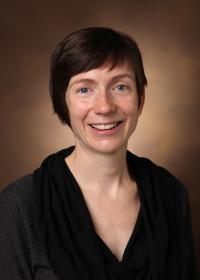The latest advances in technology enable researchers and clinicians to record large amounts of patient data at an ever-increasing rate. Mining this treasure trove of information is both an opportunity and a challenge; how do you sift through all that data to find one patient’s breakthrough?

Dr. Jessica Dennis is working to harness this big data to enable personalized medicine. She’s an expert in using large population health datasets and sophisticated computational analyses to discover how a person’s genes and environment can affect their likelihood of developing disease, their response to treatment and ultimately, their recovery.
Dr. Dennis is a new investigator with the Healthy Starts research theme at BC Children’s Hospital and is an assistant professor in the Department of Medical Genetics at the University of British Columbia.
We spoke to Dr. Dennis about her work and how her upbringing shaped her interest in genetics and health.
What got you interested in this area of research?
I’ve always been interested in human health. My grandfather was a neonatologist, and he often talked about how he used research to improve the survival of the tiniest babies in the neonatal intensive care unit. He shared medical books with me when I was younger and invited me to attend conferences with him overseas, which got me interested in research.
To this day, I keep my grandfather’s books in my office as a reminder that research really can make a difference to people’s lives.
When I went to university, even though I knew I wanted to study human health, I wasn’t really sure what path my career would take. Then the human genome was sequenced and I was hooked! I studied epidemiology as a master’s student at the University of Ottawa, and then I completed a PhD in genetic epidemiology at the University of Toronto.
During these years, I watched several friends and family members struggle with their brain health. My brother got a concussion playing rugby. Doctors said he would recover in seven to 10 days, but weeks later, he was still suffering from post-concussion symptoms like anxiety, sleep disturbance, difficulty concentrating and headaches. While these symptoms resolved months later, I started wondering why there was so much variability in how people recover from head injuries and whether we could better identify and help people who were more likely to have a poor recovery. I also watched my grandmother slowly lose her memory, which really hit home for me that it’s not just the people with brain disorders that suffer, but also their families and support systems. I decided to focus my research on the genetics of brain disorders and as a post-doctoral fellow at Vanderbilt University Medical Center, I became really involved in the genetics of brain disorders using large scale electronic health records and biobank data. Reducing the suffering associated with brain disorders remains one of the primary goals of my research program.
How do you aim to personalize health care with your research?
My team couples health information from thousands, or even millions of people, with data on genetic and epigenetic variation across the whole genome, to identify how genes influence disease.
These big datasets offer a comprehensive picture of a person’s health and environment, which helps us zoom in on which combination of genes and environmental factors contribute to disease.
I’m especially fascinated by the influence genetics can have on brain-related disorders like depression or feelings of loneliness. Have you heard of the expression “dying of a broken heart”? For more than 50 years, doctors have known that widowers are more likely to die in the year following the death of their spouse, but they weren’t quite sure why. It turns out genetics might explain it. In previous research, I used health records and genetic data from nearly 20,000 patients in Nashville, Tennessee to identify genes that increased the chance that people both felt lonely, and developed heart disease. What’s more, the genes for loneliness increased the risk of heart disease even after we accounted for the effects of environmental exposures such as smoking. In the future, these genes could help us predict heart disease risk in those suffering with depression or loneliness.
What does “big data” mean?
The term “big data” describes any dataset that you can’t open in Excel. Big data is everywhere and it improves our lives in many ways. For example, Google uses big data on traffic patterns to map your fastest route home. Amazon uses big data on purchase patterns to suggest products that may be of interest to you.
In health and medicine, the one-size-fits-all approach is becoming obsolete as big data and new technologies are allowing doctors to tailor care to individuals.
Health records are a huge potential source of this valuable data. My previous work at the Vanderbilt University Medical Center in Nashville showed that recent developments in machine learning and artificial intelligence could enable us to use this information for research into personalized health care.
I’m excited to be here at BC Children’s Hospital at a time when the hospital is scaling up its own digital health resources to enable similar types of research. BC and Canada are recognizing the value of largescale, anonymized health databases. Linking these databases to information on genetics, epigenetics and environmental exposures will help us get a more complete picture of how genes and environment influence health.
How are you enjoying Vancouver?
In addition to BC Children’s being a great place to work, I’m enjoying all the amazing outdoor activities in Vancouver. I love being able to bike to work and to go out hiking on weekends. We even saw a bear on Cypress Mountain the first time we went hiking there, which was really exciting for my kids and made the hike totally worthwhile!




